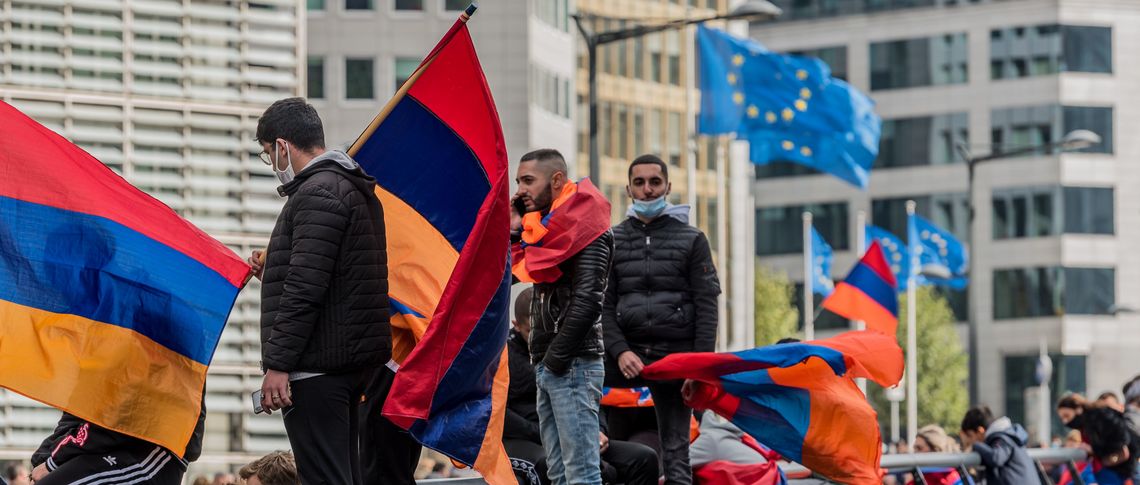In March of this year, the Armenian parliament passed a law entitled ‘Beginning the Process of Membership of the Republic of Armenia in the European Union’, which was signed by the president of Armenia Vahagn Khachaturyan a month later. Despite prime minister Nikol Pashinyan’s guarded comments, stressing that this was not a formal application for membership and calling for the public to remain ‘calm’, the law’s adoption was a strong political signal which triggered an extreme reaction from Russia.
This is an especially important step in light of the foreign policy strategy Yerevan has pursued in the past, with the Armenian leadership avoiding direct rhetoric about EU accession and, to the very last, seeking to maintain balance. As a member of virtually all the key Russian-led organisations – from the CSTO to the EAEU – Yerevan has still managed to foster relations with the West in areas that did not provoke the Kremlin. Such manoeuvring has deepened cooperation with the EU and the US on institutional reforms, democracy and civil society — without giving the impression of a geopolitical pivot.
After the Second Nagorno-Karabakh War, however, and especially with increased fighting on the border, the inaction of the CSTO and cooling relations between Armenia and Russia, Yerevan’s old approach essentially lost its effectiveness. Armenian society is increasingly calling for clearer foreign policy, including when it comes to national security. In this context, the shift towards proactively advancing the European agenda was not a spontaneous move but rather the government’s response to society’s growing need for a new foreign policy trajectory.
For the ruling elite, the EU integration bill is more than just a foreign policy act — it is a tool for redefining their own role in rapidly changing domestic circumstances.
Neither control nor domination
Sociological data has shown that, over the last two years, there has been a sharp decline in Russia’s popularity in Armenian society and a steady increase in affinity for the West. A public opinion survey conducted by the IRI in September 2024 found that just 35 per cent of respondents felt relations with Russia were ‘good’, while 80 per cent said the same of the EU and 82 per cent saw relations with the US in a positive light.
This shift in the public mood is not only a result of Moscow’s foreign policy course but also the country’s growing desire for sovereignty in decision-making processes. Armenian society has, albeit gradually, become increasingly critical of external paternalism, regardless of the source.
In this context, the European Union is perceived as a partner that seeks neither control nor domination, while the majority of the population sees Russia – the former ‘mother country’ – as having lost its legitimacy. Here, it is important to bear in mind that this is not so much about the actual state of affairs as about public perceptions, which are shaped by a multitude of political, informational and socio-cultural factors. In the current circumstances, these perceptions largely determine public and political expectations.
58 per cent of Armenian respondents said they would vote in favour of EU membership if a referendum was held this Sunday.
The rise in pro-European sentiment offers the authorities an opportunity to forge a new consensus. According to the aforementioned IRI survey, 58 per cent of respondents said they would vote in favour of EU membership if a referendum was held this Sunday. Support for the EU is particularly high among younger citizens and urban dwellers — the very people who are more active and critical, and are increasingly distancing themselves from the existing political system.
Politically speaking, this allows Pashinyan and his team to impose their agenda with virtually no competition. No major opposition force has a clear or attractive European integration agenda. This gives the ruling party an opportunity to monopolise the issue, presenting itself as the only political force capable of successfully pursuing the European course and ousting opponents when it comes to defence or criticism – which is significantly less effective in elections.
The main complaints that Armenian society levels at the authorities are not related to foreign policy but to failings when it comes to social and economic stability. However, the government’s leverage in these areas is actually rather limited — especially given the lack of resources, migration and border conflicts.
Keeping the bar high
That said, the authorities do in fact already have the means to improve the socio-economic situation – in particular by implementing the provisions of the EU-Armenia Comprehensive and Enhanced Partnership Agreement (CEPA). Although the agreement covers a wide range of areas – from improving public administration to consumer protection and developing social policy – it rarely features in public debate. Moreover, experts frequently point out that only a limited number of CEPA provisions have actually been implemented to date.
Given the circumstances, society’s attention has shifted to the more ambitious, albeit less tangible topic of discussion — Armenia’s prospects of EU accession and the conclusion of a new partnership format. According to statements by both Armenian and European officials, this format should include security sector reforms and the visa liberalisation issue, though the details are still somewhat hazy. The shift from the tangible – assessing compliance with commitments – to the abstract – the pursuit of an ‘historical goal’ – allows the government to shift its focus. Instead of engaging in a dialogue about current problems and accountability, they are focusing on the future and strategic prospects. This also enables the authorities to harness society’s emotional resources: tired of dealing with their everyday problems, citizens are increasingly willing to distance themselves from day-to-day issues in favour of an inspiring vision.
Armenian authorities cannot afford a decisive break with Moscow.
At the same time, by promoting the EU Integration Act, the Armenian leadership is trying to retain some room for manoeuvre. The authorities stress that this is not a formal application for membership and that EU accession will only be possible with a referendum. This kind of rhetoric makes it possible to ‘keep the bar high’ for both the West and the domestic audience, without aggravating tensions with Moscow to the point of no return — something which could hit Armenia extremely hard given its economic and energy dependence on Russia.
Another reason this balance is so critical is because much of Armenian business, value chains and labour migration remains tied to Russia. The authorities cannot afford a decisive break with Moscow. Thus, politically and economically, it is implementing a two-step strategy: one tailored to public expectations and the EU, the other to maintain control of the process or slow down or change the trajectory if necessary.
Given the decline in popularity of the ruling party and its leader Nikol Pashinyan, whose support fluctuates between 16 and 20 per cent, as well as general frustration with political institutions (the National Assembly, the courts, the presidency all have low levels of trust), the subject of the EU has become a tool for restoring legitimacy. This is not just an imitation of political engagement, it is the government focusing on values that society holds in high regard: democracy, transparency and development.
It is essential that the authorities not only mobilise their traditional electorate, but also win back apathetic or frustrated voters. The European agenda, unlike the ideological divisions over Karabakh or Russia, has a broad, almost cross-party appeal. This makes it particularly valuable to a government that is, in essence, less interested in winning the 2026 parliamentary elections outright than simply avoiding defeat.






